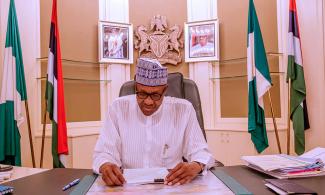
“The Girls’ Education Charter calls for the Nigerian government to increase its education budget, amend the Universal Basic Education and commit to halving the number of out-of-school children by 2030."

Nigerians have urged President Muhammadu Buhari to prioritise funding for the girl child.
A statement issued on Friday by representatives of four human rights groups noted that encouraging the education of girls will bring about positive change in the country.
To ensure improvement in the education sector for the girl child, the groups published the Girls’ Education Charter, which has got more than 2,500 endorsements so far.
A statement to that effect was signed by Abubakar Askira, Malala Fund Gulmakai Network Champion and Program Manager, Hallmark Leadership Initiative, Borno; Kiki James, Malala Fund Gulmakai Network Champion and CEO, ACE Charity, Abuja; Habiba Mohammed, Malala Fund Gulmakai Network Champion and Team Leader, Centre for Girls Education, Zaria; and Rotimi Olawale, Malala Fund Gulmakai Network Champion and Executive Director, Youth Hub Africa, Abuja.
The statement read: “Nigeria has more out-of-school girls than any other country in Africa — and the numbers are rising. To encourage the government to prioritise girls’ education, a coalition of nonprofits in the education sector worked with girls themselves to make specific demands for improvement and published them in the Girls’ Education Charter. This charter now has over 2,500 endorsements.
“The Girls’ Education Charter calls for the Nigerian government to increase its education budget, amend the Universal Basic Education and commit to halving the number of out-of-school children by 2030.
“To ensure that the voices of active citizens and girls across the country who signed the charter are heard, education advocates will continue to use the charter to engage policymakers and political leaders in the new political dispensation as education policy and budgeting takes shape.”
According to the groups, the Girls’ Education Charter makes the following demands on the government:
1. Commit to increase the education allocation to least 20% of the national budget and 6% of GDP — ensuring the planning, budgeting, and the Medium Term Sector Strategies (MTSS) processes are transparent and open to civil society organisations.
2. Amend the Universal Basic Education Act (2004) to extend its coverage from junior to senior secondary education thereby guaranteeing compulsory, free, safe and quality education with increased UBE Fund increment from 2% CRF to 5%. The UBE ACT amendment should also removed barriers and hidden costs while providing schools with adequate running costs so as to eliminate the need for hidden fees and levies imposed by school administrators.
3. In partnership with state governments, expand the National Homegrown School Feeding Program to cover all public schools in all states of Nigeria.
4. Commit to working with state and local governments to ensure the domestication and enforcement of the Child Rights Act.
5. Commit to halve the number of out-of-school children by 2030. Launch a targeted strategy for girls’ inclusion focused on increasing enrolment and retention of girls, improving the quality of secondary education for girls and addressing missing facilities and security. Indicators should be developed in order to measure progress.
6. Provide a comprehensive quality girls’ education programme in safe spaces that is responsive to the needs of young girls and adolescents.
7. Improve and scale up on a National Water, Sanitation and Hygiene (WASH) programme in schools that includes separate toilets for boys and girls as well as take cognizance of girls’ sanitary needs including the provision of sanitary pads where applicable.
8. Invest in female leadership in education by appointing tested female professionals as education minister, commissioners, education secretaries, chairmen and members of governing council and boards and other leadership positions in education.
9. Scale up Learning Resource Centres in public schools stock with gender-sensitive books and materials in line with the national curriculum.
10. Reintroduce school inspectors properly trained on all aspects of enforcement of minimum standards; properly trained on effective and efficient monitoring of gender equitable outcomes and mechanisms, and supportive of teachers in enhancing learning outcomes.
11. Improve on teacher remuneration, training and appreciation to include prompt payment of teacher salaries, better welfare packages as well as implementing programs to appreciate outstanding teachers and school administrators
“On behalf of Civil Society Organisations, education stakeholders and concerned citizens we are demanding the attention and commitment of the President of the federal republic of Nigeria and policymakers to the Girls’ Education Charter,” the statement added.